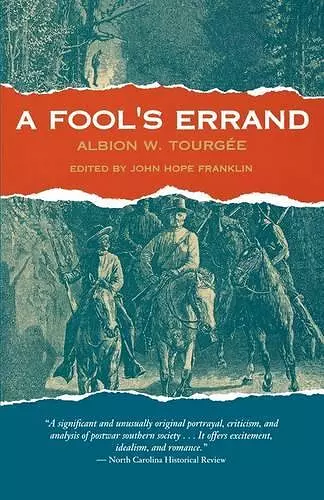A Fool’s Errand
Albion W Tourgée author John Hope Franklin editor
Format:Paperback
Publisher:Harvard University Press
Published:31st Jan '61
Currently unavailable, and unfortunately no date known when it will be back

What was a carpetbagger? Albion W. Tourgée was called one, and he wrote, “To the southern mind it meant a scion of the North, a son of an ‘abolitionist,’ a creature of the conqueror, a witness to their defeat, a mark of their degradation: to them he was hateful, because he recalled all of evil or of shame they had ever known … To the Northern mind, however, the word had no vicarious significance. To their apprehension, the hatred was purely personal, and without regard to race or nativity. They thought (foolish creatures!) that it was meant to apply solely to those, who, without any visible means of support, lingering in the wake of a victorious army, preyed upon the conquered people.”
Tourgée’s novel, originally published in 1879 anonymously as A Fool’s Errand, By One of the Fools, is not strictly autobiographical, though it draws on Tourgée’s own experiences in the South. In the story Comfort Servosse, a Northerner of French ancestry, moves to a Southern state for his health and in the hope of making his fortune. These were also Tourgée’s motives for moving South. Servosse is caught up in a variety of experiences that make apparent the deep misunderstanding between North and South, and expresses opinions on the South’s intolerance, the treatment of the Negro, Reconstruction, and other issues that probably are the opinions of Tourgée himself. “Reconstruction was a failure,” he said, “so far as it attempted to unify the nation, to make one people in fact of what had been one only in name before the convulsion of Civil War. It was a failure, too, so far as it attempted to fix and secure the position and rights of the colored race.”
Though the discussion of sectional and racial problems is an important element in the book, A Fool’s Errand has merit as a dramatic narrative—with its love affair, and its moments of pathos, suffering, and tragedy. This combination of tract and melodrama made it a bestseller in its day. Total sales have been estimated as 200,000, a remarkable record in the l880’s for a book of this kind.
Though Tourgée later disavowed his early optimism about the role national education could play in remedying the race problem...
Among the many admirable reprints issued by the John Harvard Library, one of the most welcome and attractive is this one-time best selling novel. Written by a carpetbagger following fourteen trying years (1865–1879) in the South, A Fool’s Errand not only reveals the thoughts of a carpetbagger on southern Reconstruction, but it remains one of the more perceptive descriptions of that puzzling fiasco as well as an enjoyable fictional tale. Professor Franklin’s introductory vignette satisfactorily establishes the author’s identity and the historical and ideological significance of his work… A Fool’s Errand is a significant and unusually original portrayal, criticism, and analysis of postwar southern society…it also offers excitement, idealism, and romance. * The North Carolina Historical Review *
The editor, John Hope Franklin, has written a helpful introduction [in which he] indicates the relevance of Tourgée’s book to the history of the time. Professor Franklin and his publisher are to be commended. They have made a significant book easily available, and in a much more attractive and readable format than that of any previous edition. * History News *
First published in 1879, A Fool’s Errand created much interest among readers and literary critics of the day and enjoyed, for a novel, a remarkable sale of some 200,000 copies. It is the story of Comfort Servosse, a Union officer, who at the end of the Civil War decides to make his home in the South. The author tells of Servosse’s reception there and the difficulties he and his family encounter in the trying years of Reconstruction…[as] a portrait of these tragic years, the novel is especially interesting. * Library Journal *
ISBN: 9780674307513
Dimensions: unknown
Weight: 476g
436 pages